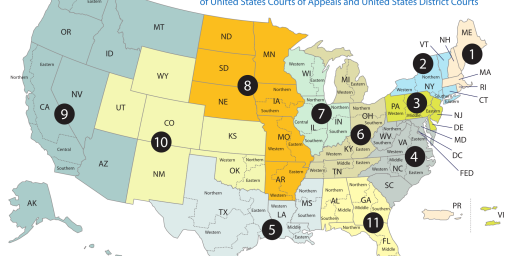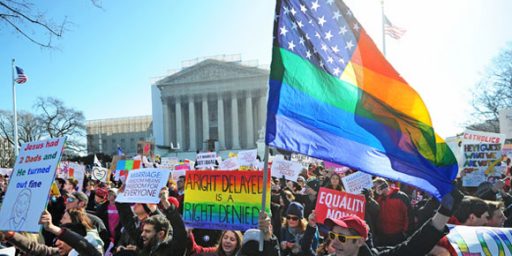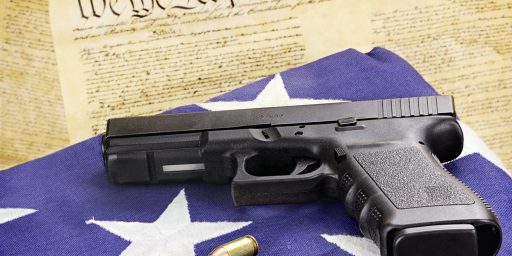Michael McConnell: Consensus Candidate?
Old friends Hugh Hewitt and Steve Bainbridge have been at loggerheads on the Harriet Miers nomination for three weeks. Now, they are united:
[L]et’s hope Bush now nominates someone the entire base can support. Mike McConnell comes to mind.
Because the assault from the left on the next nominee is going to be so intense, it makes sense to nominate a judge who has recently been vetted and FBI-checked. Fairly recent Senate hearings are also a plus, as they will demonstrate the necessary ability to handle the heat that is on the way.
[…]
The Gang of 14 must be denied an “extraordinary circumstancs” argument, so a recent nominee that was given a hearing and a vote without a filibuster is to be preferred.
A nominee who has fairly recently filled out all the forms and who has some decisions on record but not too many is to be preferred.
And the nominee should be a “base uniter.”
I think this gets us to Judge McConnell in a hurry.
Who is this McConnell, who appeals to those who like unqualified and qualified nominees, alike (sorry, couldn’t resist)?
Here’s a bio from Slate:
Michael McConnell
Age: 50
Graduated from: University of Chicago Law School.
He clerked for: Judge Skelly Wright, Justice William Brennan.
He used to be: a law professor at the University of Chicago and the University of Utah, an appellate attorney for Mayer Brown.
He’s now: a judge on the U.S. Court of Appeals for the 10th Circuit (appointed 2002).His confirmation battle: When McConnell was nominated to the 10th Circuit three years ago, he had the support of liberal law professors who called him Bush’s “most distinguished” nominee and signed a letter of support for him. Other liberal groups, on the other hand, fought hard against his confirmation, highlighting his support for expanding the role of religion in the public sphere. How to account for the split? As a respected and well-liked law professor, McConnell was well-placed to win support in the academy, and one of the arguments made on his behalf was that, as an advocate of judicial restraint, he’d be sure to follow the Supreme Court’s directives. McConnell wouldn’t be similarly bound by precedent, however, if he joined the high court himself. Instead, the combination of his hard-line conservative views and his sunny disposition could make him extremely effective at bringing about change.
Civil Rights and Liberties
In a law review article, argued that the support for school desegregation in Brown v. Board of Education is consistent with the intentions of the framers of the 14th Amendment to guarantee equal protection under the law. McConnell’s remains the minority view.In a Slate dialogue, opposed a constitutional right to assisted suicide.
Before the Supreme Court, represented the Boy Scouts in their successful suit to keep out gay scoutmasters. (Boys Scouts of America v. Dale, 2000)
On the bench, dissented from a ruling in favor of Jessica Gonzales, who sued the city of Castle Rock, Colo., when her three children were killed by her ex-husband after the police failed to enforce a restraining order against him, despite her repeated calls. McConnell said that the majority’s ruling would “expand greatly the liability of state and local governments.” A Supreme Court ruling is pending in this case. (Gonzales v. City of Castle Rock, 2004)
[Update: As commenter Anderson notes, the case has since been decided by SCOTUS. “Held: Respondent did not, for Due Process Clause purposes, have a property interest in police enforcement of the restraining order against her husband.” TOWN OF CASTLE ROCK, COLORADO v. GONZALES, Argued March 21, 2005—Decided June 27, 2005]
Separation of Church and State
In a law review article, argued that the framers intended to provide for broader protections for religiously motivated conduct than modern jurisprudence allows for.In a law review article, questioned the outcome of Bob Jones University v. United States, the 1983 Supreme Court decision that revoked the school’s tax-exempt status because it forbade interracial dating. McConnell argued that even if Bob Jones’ policy is “morally repugnant to most of us” the rule affected “only those who choose to become part of the religious community defined by Bob Jones” and so should come under the constitution’s protections of freedom of speech and freedom of religion.
In a Slate dialogue, backed government-funded school vouchers that can be used at parochial schools. Argued that religious activity in a public setting or paid for by public funds is OK, as long as the government remains neutral rather than supporting a particular faith.
Agreed to grant a preliminary injunction to a New Mexico sect to stop the government from prosecuting its members for using a hallucinogenic tea during worship. In a concurrence, McConnell argued that the sect’s interest in religious observance trumped the health risk to the sect’s members and the interests of the federal government in enforcing its drug laws. (O Centro Espirita Beneficiente Uniao do Vegetal v. Ashcroft, 2003)
Environmental Protection and Property Rights
For a unanimous panel, upheld a law that Congress passed specifically to permit logging in the Black Hills National Forest in South Dakota. The law upended a court settlement designed to prevent the logging from going forward. (Biodiversity Associates v. Cables, 2004)Criminal Law
For a unanimous panel, held that the federal prosecution of a child pornographer—who paid a boy to photograph him and transported him across states lines—was consistent with Congress’ power to regulate interstate commerce. (U.S. v. Riccardi, 2005)Abortion
In 1996, signed a statement supporting a constitutional amendment to ban abortion. “We believe that the abortion license is a critical factor in America’s virtue-deficit,” the statement reads.Before Congress, testified in opposition to a bill designed to limit the access of protesters to abortion clinics.
Judicial Philosophy
Supports the originalist approach to constitutional analysis, which urges judges to interpret the Constitution in accordance with the understandings of its framers.
This from WaPo:
Michael W. McConnell
Michael W. McConnell, 50, has been a judge on the U.S. Court of Appeals for the 10th Circuit, based in Denver, since his appointment by President Bush in 2002.
Before then, he was mostly a legal academic, having served as a law professor at the University of Chicago from 1985-1996 and subsequently at the University of Utah.
McConnell’s good standing with the legal professoriate helped him immeasurably during the confirmation process; more than 300 of his fellow professors, including many liberals, endorsed him for the bench.
An eclectic thinker who served both as a law clerk for the liberal icon Justice William Brennan and as an official in the Reagan administration, McConnell has expressed his opinions on a wide range of subjects, including a Wall Street Journal op-ed in December 2000 in which he expressed doubts about the legal reasoning of the Supreme Court’s Bush v. Gore decision.
But his outspoken disagreement with Roe v. Wade has earned him the condemnation of liberal advocacy groups (though at his confirmation hearing he called it "settled law.") Conservatives like his writings favoring government "neutrality" toward religion.
As a judge, McConnell has upheld Congress’s power to criminalize the possession of homemade child pornography; in a case soon to be reviewed by the court, he voted to prohibit enforcement of federal anti-drug laws against people who consume hallucinogenic tea as part of a religious ritual.
— Charles Lane
A somewhat dated bio from his law school faculty page:
Michael W. McConnell joined the faculty in 1997 after teaching at the University of Chicago Law School for 12 years, where he was William B. Graham Professor of Law. Prior to his teaching career, Professor McConnell served as assistant to the solicitor general with the U.S. Department of Justice, assistant general counsel for the U.S. Office of Management and Budget, and clerked for Chief Judge J. Skelly Wright, of the District of Columbia U.S. Circuit Court of Appeals. He also served a clerkship with U.S. Supreme Court Justice William J. Brennan. Among the country’s most distinguished scholars in the fields of constitutional law and theory with a specialty in the religion clauses of the First Amendment, Professor McConnell has argued 11 times before the U.S. Supreme Court. He is widely published in the areas of church-state relations and the First Amendment. He is a Fellow of the American Academy of Arts and Sciences, and was sworn in as a judge on the 10th U.S. Circuit Court of Appeals on January 3, 2003. He earned his undergraduate and juris doctor degrees with honors, was elected to Order of the Coif, and was the comment editor for the “University of Chicago Law Review.”
The haircut and the Brennan clerkship concern me. I also prefer Scalia’s “textualist” approach to an “originalist” one because it is easier to divine what people wrote than what they thought. But, in the spirit of rebuilding unity within the GOP, I’m willing to back McConnell’s nomination. Let it be so.
Update:
Confirm Them has doubts about McConnell, along with lots of links.
Volokh Conspirators Eugene Volokh and Orin Kerr are pro-McConnell.
Hotline reports: “One name we’re hearing a lot this morning (including from a White House official) is appeals court judge Michael McConnell, who is based in Utah. And a White House official tells the Hotline that Bush will not nominate anyone today but would not rule out tomorrow.”
Drew McKissick is rounding up lists of nominees and reactions to them.
AP has a pretty long list of their own. Yes, McConnell is on it.
PoliPundit offers a rather bizarre indictment of McConnell:
Two nominees on the usual conservative lists that I would probably oppose.
Judge Michael W. McConnell Рhe̢۪s a solid conservative scholar, but he isn̢۪t partisan enough. He̢۪s argued that Bush v. Gore was a bad decision. That alone should disqualify him; the next time a case like that comes up, we need to be sure of a 5-4 majority.
Maureen Mahoney – she’s a brilliant conservative lawyer, much in the John Roberts mold. But Mahoney has a secret – she supports racial discrimination in the name of affirmative action. It’s not just that she argued for the University of Michigan cases that kept affirmative action legal. It’s that she whole-heartedly seems to support quotas as a matter of policy. Quote: “I’m a Republican, and there’s a common misconception that all Republicans oppose affirmative action. I care deeply about this case.â€
He’s not partisan enough?! That should be a good thing, right? Don’t we want an independent judiciary? Don’t Republicans support judges who will interpret the law as written rather than imposing their personal policy preferences? It seems that I’ve heard that somewhere.
Previous McConnell mentions on OTB:








FYI, Gonzales lost the case before the present Supreme Court.
Anderson: Good point. What’s odd is that the decision came down several days before the Slate piece was written. Update appended above.
Thanks for the link, JJ, I was too lazy to look.
When the case came out, I was disappointed because the general holding Gonzales sought was long overdue; but I had to agree that on the facts, her case wasn’t the vehicle for it. States owe it to their citizens to put teeth in restraining orders, and unless/until they do, I can see why the federal courts would be helpless to intervene.
Interesting lineup, since Souter and Breyer joined the majority, so it’s difficult to peg McConnell on that basis. And his advocacy in Dale naturally doesn’t suggest that he’s a homophobe.
If we have to get an arch-conservative, let it be a smart one like McConnell, who I am supposing has principles.
When I click on the ConfirmThem link above, it takes me to a WordPress login page.
Bobbert: Fixed now.
Thanks.
The main problem with this guy is that he is too independent. Bush needs to put a good guy in there–I am thinking Ken Mehlman would be good, or Tommy Franks.